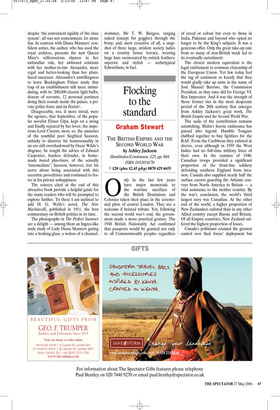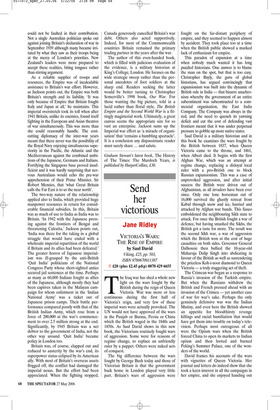Flocking to the standard
Graham Stewart
THE BRITISH EMPIRE AND THE SECOND WORLD WAR by Ashley Jackson Hambleden/Continuum, £25, pp. 604 ISBN 1852854170 ✆ £20 (plus £2.45 p&p) 0870 429 6655 Only in the last few years have major memorials to the wartime sacrifices of the British Dominions and Colonies taken their place in the ceremonial plots of central London. They are a welcome if belated tribute. Yet, following the second world war’s end, the government made a more practical gesture. The 1948 British Nationality Act confirmed that passports would be granted not only to all Commonwealth peoples regardless of creed or colour but even to those in India, Pakistan and beyond who opted no longer to be the King’s subjects. It was a generous offer. Only the great take-up rate from so many of non-British stock led to its eventually curtailment.
The closest modern equivalent is the legal entitlement to common citizenship of the European Union. Yet few today feel the tug of sentiment so keenly that they would gladly take up arms in the name of José Manuel Barroso, the Commission President, as they once did for George VI, Rex Imperator. And it was the strength of those former ties in the most desperate period of the 20th century that emerges from Ashley Jackson’s great work, The British Empire and the Second World War.
The scale of the contribution remains astonishing. Malta’s heroic endurance has passed into legend. Humble Tongans clubbed together to buy Spitfires for the RAF. From the Caribbean they enlisted in droves, even although in 1939 the West Indies had no full-time military force of their own. In the summer of 1940, Canadian troops provided a significant proportion of the front-line soldiery defending southern England from invasion. Canada also supplied nearly half the surface escorts guarding the Atlantic convoys from North America to Britain — a vital assistance to the mother country. By the war’s conclusion, the world’s third largest navy was Canadian. At the other end of the world, a higher proportion of New Zealanders enlisted than in any other Allied country except Russia and Britain. Of all Empire countries, New Zealand suffered the highest proportion of losses.
Canada’s politicians retained the greatest control over their forces’ deployment but could not be faulted in their contribution. Not a single Australian politician spoke out against joining Britain’s declaration of war in September 1939 although many became irritated by what they saw as their troops being at the mercy of London’s priorities. New Zealand’s leaders were more prepared to accept these realities, biting tongues rather than stirring argument.
As a reliable supplier of troops and resources, the Empire was of incalculable assistance to Britain’s war effort. However, as Jackson points out, the Empire was both Britain’s strength and its liability. ‘It was only because of Empire that Britain fought Italy and Japan at all,’ he maintains. This imperial overstretch took its toll when after 1941 Britain, unlike its enemies, found itself fighting in the European and Asian theatres of war simultaneously. This was more than she could reasonably handle. The costcutting diplomacy of the inter-war years meant that there never was the possibility of the Royal Navy enjoying simultaneous superiority in the Pacific, the Atlantic and the Mediterranean against the combined ambitions of the Japanese, Germans and Italians. Fortifying the Singapore base proved insufficient and it was hardly surprising that nervous Australians would echo the pre-war apprehension of their Prime Minister, Sir Robert Menzies, that ‘what Great Britain calls the Far East is to us the near north’.
The two-way nature of the relationship applied also to India, which provided huge manpower resources in return for considerable financial subsidies. In this, Britain was as much of use to India as India was to Britain. ‘In 1942 with the Japanese pressing against the frontiers of Bengal and threatening Calcutta,’ Jackson points out, ‘India was there for the taking in a global struggle that would have ended with a wholesale imperial repartition of the world if Britain and its allies had been defeated.’ The greater horror of Japanese imperialism was ill-grasped by the anti-British ‘Quit India’ politicians of the National Congress Party whose short-sighted antics secured jail sentences at the time. Perhaps as many as 60,000 Indians fought as allies of the Japanese, although mostly they had been captives taken in the Malayan campaign for whom enlistment in the ‘Indian National Army’ was a ticket out of Japanese prison camps. Their battle performance compared poorly with that of the British Indian Army, which rose from a force of 200,000 at the war’s commencement to over 2.5 million strong at the end. Significantly, by 1945 Britain was a net debtor to the government of India, not the other way around. ‘Quit India’ became policy in London too.
Britain was, of course, clapped out and reduced to austerity by the war’s end, its superpower status eclipsed by its American ally. With most of Britain’s overseas assets flogged off, the conflict had damaged the imperial nexus. But the effort had been appreciated. When the fighting stopped, Canada generously cancelled Britain’s war debt. Others also acted supportively. Indeed, for most of the Commonwealth countries Britain remained the primary trading partner in the years after the war.
The author of this even-handed book, which is filled with judicious evaluation of the evidence, is a military historian at King’s College, London. He focuses on the wide strategic sweep rather than the personal anecdotes of foot soldiers at the sharp end. Readers seeking the latter would be better turning to Christopher Somerville’s 1998 book, Our War. For those wanting the big picture, told in a lucid rather than florid style, The British Empire and the Second World War is a fittingly magisterial work. Ultimately, a great canvas seems the appropriate size for so vast an enterprise. Jackson sums up the Imperial war effort as ‘a miracle of organisation’ that ‘remains a humbling spectacle’. It is a conclusion any dispassionate reader must surely share ... and salute.
Graham Stewart’s latest book, The History of The Times: The Murdoch Years, is published by HarperCollins, £30.











































































































 Previous page
Previous page